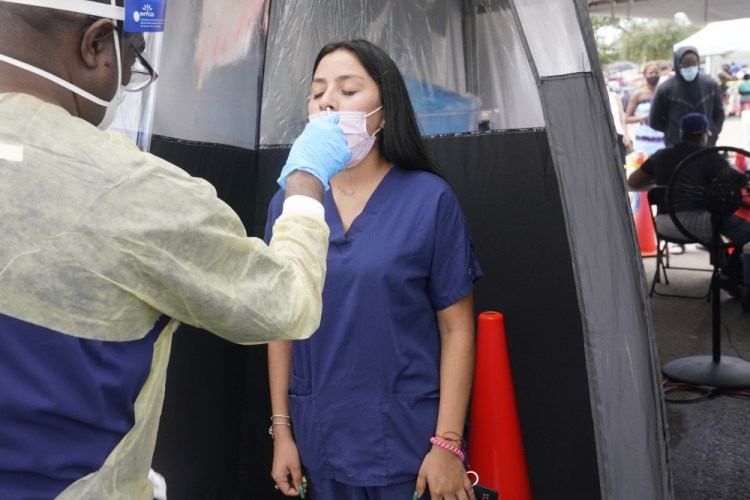The federal government is sending hundreds of ventilators and other equipment to Florida – a response to the record number of coronavirus hospitalizations in a state that has become the epicenter of the U.S. pandemic.
At Florida’s request, the Department of Health and Human Services approved sending 200 ventilators and 100 smaller breathing devices and related supplies earlier this week, an agency spokesperson told The Washington Post. The devices came from the U.S. government’s Strategic National Stockpile, the federal repository for medical response.
Weesam Khoury, a spokesperson for the Florida Department of Health, told The Post on Wednesday that the agency helped make the request to the federal government, saying it “reviews health care needs statewide on a consistent basis.”
“The Department routinely works with the federal government to ensure adequate resources are available and ready to be distributed at all times, as done with this recent request,” Khoury said.
Republican Gov. Ron DeSantis on Tuesday cast doubt on the ventilator request, telling WPLG, the first to report the news, that he was unaware of the federal allocation for more equipment.
“I have not heard about that, so I have to check to see if that’s true or not. I would honestly doubt that that’s true, but I’ll look,” he said. “We have a lot of stuff that we stockpiled over the last year and a half through the Department of Emergency Management. I have not had any requests across my desk. I haven’t been notified of that.”
A spokesperson for DeSantis did not immediately respond to request for comment early Wednesday.
The reported increase in ventilators comes at a time when the coronavirus is roaring in Florida, where an average of more than 20,000 people a day are being infected. The summer spike, fueled by the highly transmissible delta variant and millions of Americans who remain unvaccinated, has resulted in nearly 15,200 people in Florida to be currently hospitalized for covid-19 as of early Wednesday, according to data compiled by The Post.
The current number of hospitalizations is roughly 145% more than it was in July 2020, the state’s previous peak, according to the Florida Hospital Association.
More than 3,000 intensive care unit beds are filled, accounting for nearly 90% of state’s ICU beds, the group said.
“There is this rapid, accelerated rise that is unprecedented,” Ed Jimenez, CEO of the University of Florida Health Shands Hospital, told MSNBC. Jimenez added that 90% of the patients at his hospital in Gainesville, Fla., are unvaccinated.
About 50% of the state’s population is fully vaccinated.
Despite the public health crisis in Florida, which is now reporting a fifth of all new U.S. infections and current hospitalizations, DeSantis has banned mask mandates in the state and recently railed against reporters for creating “hysteria” about rising hospitalizations. The Republican governor has repeatedly said the surge in the state is “seasonal.”
The governor’s recent executive order, which allows the state’s Department of Education to withhold funding from school boards unwilling to adhere to the ban on mask mandates, is being ignored by several school districts that are requiring students to wear masks anyway. President Joe Biden indicated Tuesday that the White House is researching whether his administration has the authority to intervene in bans on mask mandates.
“We are continuing to look for ways . . . for the U.S. government to support districts and schools as they try to follow the science [and] do the right thing and save lives,” White House press secretary Jen Psaki told reporters Tuesday.
Khoury said in a statement to The Post that the Florida Department of Health is ensuring that correct supplies, such as the additional ventilators, are “deployed across the state as efficiently as possible.”
“Through robust coordination with medical professionals at DOH and on the ground at hospitals, it can be determined what exact resources are needed and best suited for a specific facility, and we will always work to ensure ventilators and oxygen flow systems are quickly deployed,” Khoury said.
Doctors in the state, like Joshua Lenchus, told WPLG that he welcomed the increase in supplies for health professionals strained by the crushing fourth wave of the pandemic.
“The nurses, the physicians, they have passed burnout a long time ago,” said Lenchus, Broward Health’s chief medical officer. “This is sheer exhaustion.”
Send questions/comments to the editors.



Success. Please wait for the page to reload. If the page does not reload within 5 seconds, please refresh the page.
Enter your email and password to access comments.
Hi, to comment on stories you must . This profile is in addition to your subscription and website login.
Already have a commenting profile? .
Invalid username/password.
Please check your email to confirm and complete your registration.
Only subscribers are eligible to post comments. Please subscribe or login first for digital access. Here’s why.
Use the form below to reset your password. When you've submitted your account email, we will send an email with a reset code.